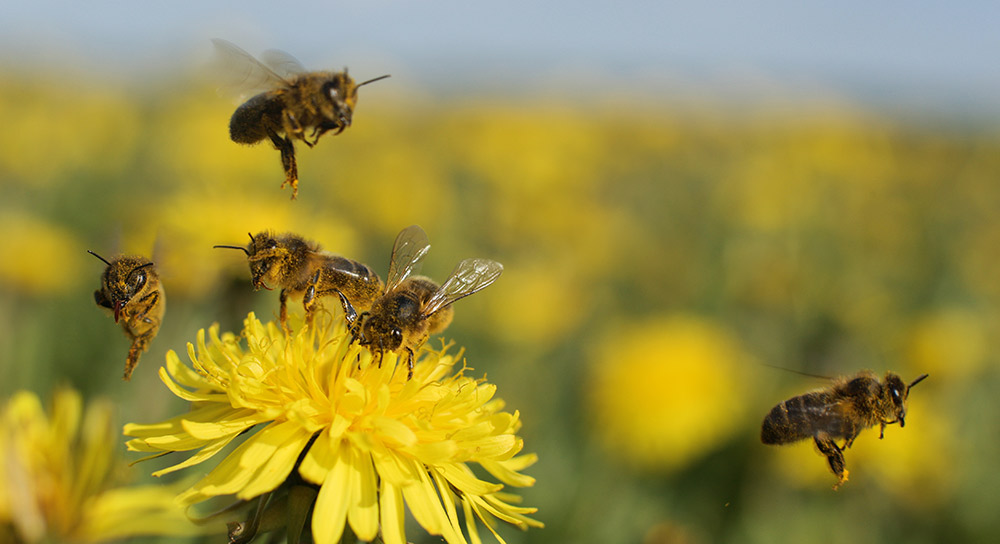It’s nearly summer in the Central San Joaquin Valley, so we have to be mindful of seasonal hazards — including summertime bugs attracted by our region’s growing fields, landscaped yards, swimming pools and irrigation.
According to Dr. Susanne Spano, director of the Wilderness Medicine Fellowship at UCSF Fresno, most people coming into Community Health System’s emergency departments complaining of a bite or sting have encountered mosquitoes, black widow spiders or bees. These bites become problematic when the patient scratches them open and the bite becomes infected.
“In this case, prevention is really the key to happiness,” noted Spano. There are several ways to protect yourself and your family this summer from stinging and biting insects.
The buzz on bees
Bees are attracted to places with a lot of plants and water. And while they’re beneficial to the environment, they can sting when provoked (after being stepped or sat on, for example).
Most people who get stung by a bee experience temporary pain and irritation at the site of the sting. You’ll want to remove the stinger immediately with tweezers then wash the sting area with soap and water. You may want to apply hydrocortisone cream or calamine lotion to ease any redness, itching or swelling.
If you have a more serious reaction from a bee sting — which can occur in about 5% of the population — your healthcare provider can refer you to an allergist who can prescribe an emergency medication, such as an epinephrine auto injector.
Wasps and yellow jackets
Wasps and yellow jackets may sting for an entirely different reason. “They’re usually defending their nests,” Dr. Spano said. These insects build nests that hang in protected areas, such as under eaves, in attics, or under tree branches or vines.
“Most people get stung because they’re trying to take down the nest while it’s still their season, and that’s a terrible idea,” said Dr. Spano.
If you do get stung, remove the stinger and clean the area. You can use a cold compress to reduce the pain and swelling and apply hydrocortisone cream or calamine lotion.
Of course, if you have a swarm or a nest of wasps or yellow jackets near your home, you should call a professional pest control company to come out and remove it.
When mosquitoes are more than pests
Mosquito season in California usually starts in early March and ends in late October when the weather starts to cool down.
While mosquito bites are irritating, the larger threat can be from diseases they can carry, including Zika, dengue, chikungunya, and West Nile virus. “We certainly see children with West Nile here, which is sort of a flu-like illness that occurs five to 15 days after the bite,” said Dr. Spano.
Symptoms of West Nile include headache, body aches, joint pains, vomiting, diarrhea or a rash on the trunk of the body. “If you have these flu-like symptoms in the middle of summer when the flu is not prevalent … maybe it’s COVID-19, maybe it’s West Nile. So that’s something I would definitely get checked,” she said. West Nile can turn into encephalitis and cause serious health problems.
To protect yourself and your family, you’ll want to remove standing water from your yard and avoid being outdoors during peak mosquito times (dawn and dusk).
An ounce of prevention
To help prevent bug bites, the American Academy of Dermatology Association recommends:
Insect repellent. To protect you from mosquitoes, ticks and other bugs, use an insect repellent that contains 20 to 30% DEET, a synthetic repellent (or DEET alternative), and spray all of your exposed skin and clothing. For those who prefer natural remedies, consider lemon eucalyptus, citronella (with vanillin), neem oil, catnip oil or grapefruit seed extract.
Appropriate clothing. If you’re out in the woods, wear long-sleeved shirts, pants, socks and closed shoes instead of sandals. You can also pre-treat outer layers of clothing with insect repellent containing the active ingredient permethrin.
Bed nets. If you’re camping, use bed nets to protect against mosquitoes, preferably one pre-treated with pyrethroid insecticide.
Don’t panic if you’re stung or bitten
People coming into the emergency room are concerned they’ll have an allergic reaction from the sting but there’s really no reason to panic, said Dr. Spano.
“Most of the severe allergic reactions, about 90% will occur within the first hour. So if you’re not seeing a severe reaction by then, unless you have a prior history of a severe allergic reaction, usually you’re pretty safe,” she said.






